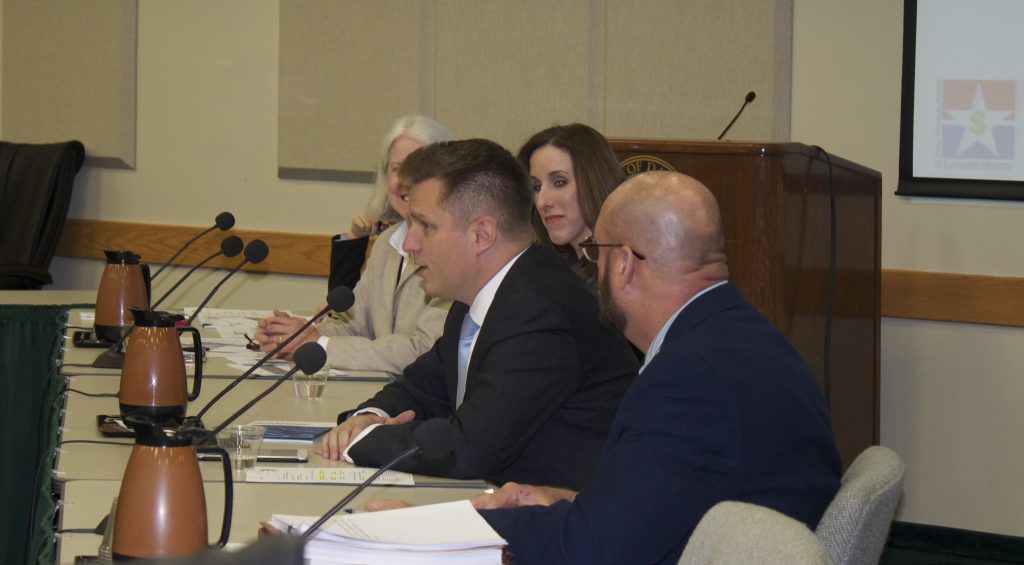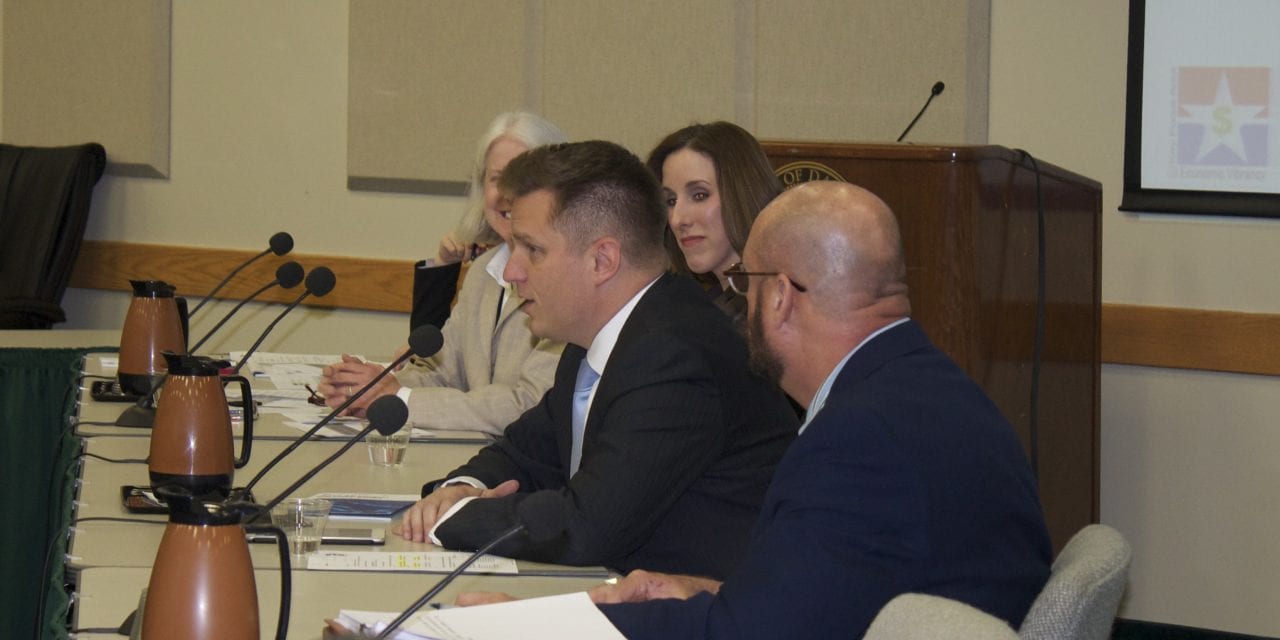
Fort Worth Councilman Joel Burns, center, speaks during the Finance, Budget and Audit Committee meeting Tuesday. Burns joined Dallas Assistant City Attorney John Rogers, Dallas interim Assistant City Manager Theresa O’Donnell and HRC’s Cathryn Oakley to encourage the committee to pass a resolution in support of LGBT policy changes in Dallas. (Steve Ramos/Dallas Voice)
Dallas councilmembers voted Tuesday to send a resolution to the full City Council to address inequalities in city employment, healthcare and lobbying efforts.
In a 4-1 vote at the Budget, Finance and Audit Committee, councilmembers voiced support for the “Comprehensive Statement of Support” resolution, which guides city staff and the city’s LGBT Task Force to research areas for improved LGBT equality and report back to the committee quarterly on the progress. Items will then be addressed on an individual basis and voted on.
Members who voted in favor of it were Committee Chair Jerry Allen, who originally pushed for a broad statement of support, Vice Chair Jennifer Gates, Philip Kingston and Tennell Atkins. Sheffie Kadane voted against it because he said he didn’t like that it focused solely on the LGBT community.
O’Donnell said a resolution wasn’t originally expected to go before the committee Tuesday, but members of the city’s LGBT Task Force encouraged a resolution so research about policy changes could begin.
Atkins, who never voiced support or opposition for the marriage equality resolution in June, said he was supportive of the current resolution but wanted individual items brought before the committee for approval.
“I agree with this. … I agree with what you’re trying to do,” Atkins said. “I would support something on this magnitude as long as we review each one line by line. I would support an issue at a time.”
Gates said she was confused about what the resolution would accomplish, saying that she wanted to look into other indexes that addressed other minority communities. Kingston explained that backing the resolution didn’t approve any policy change; rather it recommended it to the full council and would return to the committee with specific changes.
The resolution will now head to the full council for final approval.
The resolution addresses four key factors: ways in which the city can fix disparities for LGBT employees, including pensions; healthcare coverage; improving the city’s Municipal Equality Index score and lobbying opportunities at the state and federal level.
During the meeting, Cathryn Oakley with the Human Rights Campaign, explained the Municipal Equality Index. Oakley, the main author of the MEI, said Dallas could improve its score. Dallas scored an 81 on last year’s second annual MEI, up from a 76 the year before.
Oakley said a better score could be obtained by offering comprehensive transgender healthcare for city employees, as well as equivalent family leave and mandate that city contractors offer domestic partner benefits to its employees.
And while transgender healthcare coverage has been bonus points for cities, Oakley said Tuesday that cities would have to offer the coverage or lose points on this fall’s report because the item would be standard points this year.
“Despite the word bonus, these are not unimportant,” Oakley said about trans coverage. “They are important.”
Oakley’s presentation and a subsequent one by interim Assistant City Manager Theresa O’Donnell are part of dialogue that started in December when O’Donnell and Assistant City Attorney John Rogers briefed the committee on the federal Defense of Marriage Act. Allen asked the two of them to speak to the committee after the marriage equality resolution failed to go before the council in June.
They then briefed the committee last month on the hundreds of rights associated with marriage equality, touching on a few things the city could change to recognize it’s LGBT employees’ relationships. Among those items is the pension. Same-sex partners are treated as any other beneficiary when their spouse who works for the city dies. The benefits eventually run out, compared to opposite-sex spouses who receive benefits for life.
Council members asked for a list of things that could be done administratively and others that required council approval, so O’Donnell categorized “a laundry list” of about 30 things that had to do with the city as an employer, as a place to live and as an advocate.
Openly gay Fort Worth Councilman Joel Burns attended the committee meeting to shed light on the changes made in Cowtown. Fort Worth made a 91 on the MEI last year. He attributed the progress to the 2009 raid on the Rainbow Lounge and how the city and police then worked together, forming a Diversity Committee to address LGBT issues within the city. Now every city employee must complete diversity training. Citywide training is a recommendation for Dallas as well.
“It’s basic decency and how you treat people,” Burns said about the training. “And a little bit of cultural competency.”
Among other Dallas issues to be addressed in the future are an LGBT employee resource group, LGBT recruitment efforts, a domestic partner registry and having the city’s lobbyists push for statewide and federal employment nondiscrimination measures and other pro-equality legislation.
“Those will be a work in progress that I think will take many, many weeks and months to accomplish,” O’Donnell said.
Read the resolution below.
















